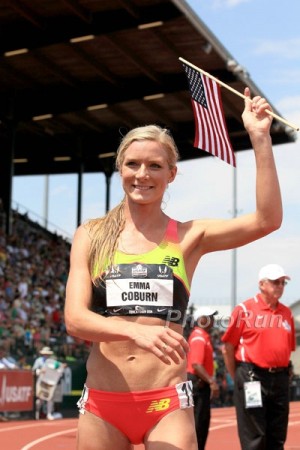2016 Olympic Women’s Steeple Preview: Can Emma Coburn Earn the U.S.’s First Steeple Medal? Will The World Record Fall?
by LetsRun.com
August 10, 2016
(Editor’s note: Our recap of today’s first round can be found here: LRC Women’s Steeple Prelims:Emma Coburn’s Medal Chances Go Up As All Three Americans Make The Final)
If you need a reason to get excited about the women’s steeplechase at the 2016 Summer Olympics, how about this one: three of the four fastest women of all time will be on the starting line on the morning of Monday, August 15 (yes, another morning final). That would be Kenyan-born Ruth Jebet of Bahrain (8:59.97), reigning world champ Hyvin Kiyeng of Kenya (9:00.01) and reigning Olympic champ Habiba Ghribi of Tunisia (9:05.36). That’s quite a race in and of itself. Plus there’s the greatest American ever, Emma Coburn (9:10.76). And does anyone remember how close last year’s World Championship final was (five women together off the final water jump)? Excited yet?
We break down the race in full below.
| Race Times Prelims: Saturday, August 13, 9:05 a.m. ET Final: Monday, August 15, 10:15 a.m. ET 2015 Worlds results 1. Hyvin Kiyeng, Kenya 9:19.11 2. Habiba Ghribi, Tunisia 9:19.24 3. Gesa Felicitas Krause, Germany 9:19.25 4. Sofia Assefa, Ethiopia 9:20.01 5. Emma Coburn, USA 9:21.78 2016’s Fastest performers (among women entered) |
On paper, three women stand out above the rest in 2016: Jebet and Kiyeng, both of whom gave the 8:58.81 world record a scare at the Pre Classic, and Coburn, who broke the American record in the same race. That race at Pre wasn’t a fluke. Between them, Jebet and Kiyeng have combined to run the five fastest times on the year, no one has run within 10 seconds of their season’s bests and neither woman has lost except to the other (Jebet prevailed at Pre; Kiyeng came out on top in Shanghai). The two women haven’t just won; they’ve dominated. Here are their margin of victories:
Jebet
May 28 (Pre Classic): .04 of a second (over Kiyeng; third was an additional 10.75 secs behind)
June 16 (Stockholm): 14.19 seconds
Kiyeng
April 22 (Kenyan Police Champs): 2.3 seconds
May 14 (Shanghai): 8.56 seconds (over Jebet; third was an additional 5.09 secs behind)
June 9 (Oslo): 8.96 seconds
July 1 (Kenyan Trials): 13.55 seconds
Running historically fast times and crushing the competition is usually a good thing in an Olympic year. Their consistent brilliance (Kiyeng has the #2, #3 and #5 performances on the year; Jebet has #1, #4 and #7) means that they have to be favored to go 1-2 in some order in Rio.
That outcome is likely, but it’s not a lock. Ghribi generally doesn’t race much before major championships (she ran just one steeple before Worlds last year and one before the Olympics in 2012) but she knows how to peak, as she’s medalled in each of her last three global championship appearances (she missed Moscow, but won gold in 2011 and 2012 and silver behind Kiyeng in 2015). Though her 2016 opener was rough (9:31 for 6th in Stockholm on June 16), she won comfortably (9:21) in London on July 23 in her last pre-Olympic race. 9:21 isn’ t fast but you need to realize that in 2012 when Ghiribi won the Olympics (she finished 2nd but has been upgraded to gold due to a doping violation) she only had run 9:25 before the Olympics where she ran 9:05. That doesn’t necessarily mean she’ll be able to contend with Jebet and Kiyeng in Rio, but she ran 9:05 last September, so she’s certainly capable of reaching that level again.
Coburn has yet to produce an all-time great performance like the three women we’ve mentioned so far, but she may have a 9:0x in her this year. Remember, Coburn battled an Achilles injury last fall and winter and was not expecting to run 9:10 in her first steeple of the year at Pre — she said her coach told her sub-9:20 would be a good day. Coburn has stayed stateside and raced sparingly this year, which means she hasn’t as many opportunities to run fast as her international competition. But she looked comfortable in running a controlled 9:17 at the Trials, pulling away over the final kilometer, and spoke confidently afterwards.
“Obviously, the top two women of the year so far have challenged the world record and I’m a good 10 seconds behind them,” Coburn said. “But one good thing is that they both seem to be aggressive racers who don’t mind pushing the pace. It would be pretty hard to run 9:00 pace by yourself pushing the whole time. If they want to do it, that’s great and I’ll be chasing them trying to run them down. I don’t think anyone’s unbeatable. And I think especially a championship race, everyone’s vulnerable. I hope to lower my time and I feel fit enough to lower my time and close the gap a little bit.”
That sounds like a woman who learned a lot from Worlds last year, the first global championship in which Coburn entered as a true medal contender. Last year, Coburn said at USAs that her goal was to finish in the top five at Worlds. Coburn accomplished that by taking fifth, but after her race in Beijing, she said felt she could have medalled. She also witnessed a race that did not go according to the form charts: though Ghribi and Kiyeng (who went 1-2) had the top two times on the year coming in, Germany’s Gesa Felicitas Krause was only ranked #7 and was not considered a threat to medal. Yet Krause did just that and came .14 short of gold.
Lessons: Coburn is absolutely among the best women in the world. And if it comes down to a kick, anything can happen.
But if medalling is the goal, Coburn’s best hope is for the Olympics to play out just like Pre. Coburn was in 9:10 shape in May, and she thinks she’s in better shape now. If that’s the case and Jebet and Kiyeng turn it into a time trial, Coburn has to like her chances as she’s over six seconds ahead of the fourth-fastest woman on the year, Etenesh Diro Neda of Ethiopia. And even if it doesn’t go super fast, Coburn has the experience and confidence to go from the front. She’s had most of her success in races where she either pushes the pace or the race strings out; it’s not in her best interest to leave it to a kick and allow more people into the race. The good news is that Jebet really likes to lead as well, so Coburn may not have to do the work.
If Coburn does medal, she’d be the first American to do so in the women’s steeple since it was first contested at Worlds/Olympics in 2005. And her country is counting on her. The U.S. only took home one distance medal at Worlds last year (Emily Infeld), a total USATF would surely like to improve. Coburn, with her fifth-place finish last year and her status as the third-fastest woman in the world in 2016, has to be considered one of the U.S.’s very best medal threats, if not the best threat in the distances. You could make an argument for Evan Jager in the men’s steeple or Matthew Centrowitz in the men’s 1500, but Jager still has to prove he can kick with the Kenyans and the men’s 1500 is deeper than the women’s steeple.
Other Potential Medallists
The podium is likely to consist of three out of Kiyeng, Jebet, Ghribi and Coburn (in some order). But as we saw last year, surprises happen. Here’s who else could threaten:
- Etenesh Diro Neda, Ethiopia, 25 years old: Diro Neda didn’t make the final at Worlds last year, but she was 5th at the 2012 Olympics and the 2013 Worlds. At 9:16, she’s #4 on the world this year, but she’s been extremely inconsistent: she was 4th at the Ethiopian Champs in April in 10:10, ran 9:16 and 9:19 in two Diamond League races, then DNF’d at the African Champs on June 26 (her most recent race). If the good version of Diro Neda shows up in Rio, she has a shot at a medal.
- Beatrice Chepkoech, Kenya, 25 years old: Chepkoech has been solid this year, taking 4th at Pre, 2nd behind Jebet in Stockholm and 2nd behind Kiyeng at the Kenyan Trials. She hasn’t been close to the win in any of those races, but if the chasm between the top two and the rest of the world is really as wide as it appears — or if one of them falters — she could still medal.
- Sofia Assefa, Ethiopia, 28 years old: Assefa is rarely brilliant but always good, and she’s kept up her consistency in 2016, taking 3rd, 5th, 2nd and 4th in four DL outings. Though she’s never won gold on the biggest stage, she’s finished in the top five in each of the past four global outdoor championships.
- Gesa Felicitas Krause, Germany, 24 years old: Krause snuck up on people last year, and given how well the top women have been running this year, it would still qualify as a minor surprise if she medals in Rio. But not much of a surprise. The German is in the shape of her life, running PRs for the 1500, mile, 3000 and steeple so far this year. That final PR came on July 10 in Amsterdam, where Krause pasted the field to win her first European title.
The other members of Team USA, Courtney Frerichs and Colleen Quigley, are seeded eighth and ninth, respectively, among Olympic entrants. While a medal for either is a long shot, both are coming off PRs at USAs and will be expected to make the 15-person final (Quigley was 12th in Beijing last year).
LRC Prediction: 1. Kiyeng 2. Jebet 3. Coburn
Kiyeng and Jebet have been the best in the world all season and we expect them to continue their dominance in Rio. Though Kiyeng lost to Jebet at Pre, she is the reigning world champ and beat her convincingly in Shanghai. At 24, she’s also more experienced than the 19-year-old Jebet. Kiyeng has finished sixth and first in two World Champs appearances; Jebet was only 11th last year in Beijing. Plus Jebet hasn’t raced since June 16th which makes us a little uneasy. Their front-running style plays into Coburn’s hands, and the American earns the U.S.’s first distance medal of the games — setting the American record in the process.
In our minds, Coburn, should medal as she has 6+ seconds on the world #4 this year and Ghiribi can’t be expected to run a monster SB yet again. That being said, if Jebet wins and breaks the WR and Ghiribi denies Coburn a medal, we’re going to be kicking ourselves for not picking their talent.
If a WR falls on the track in Rio, this might be the most likely event.
Free Betting advice. Even though Coburn is the world #3 this year, you can get 7/2 odds on her medalling. Those are great odds.
Talk about this event on our world famous messageboard: MB: Olympic Women’s Steeplechase Preview: Can Emma Coburn win USA’s 1st ever medal? Will the WR fall?
| [gravityform action=”polls” id=”433″ mode=”poll” cookie=”1 month” show_results_link=”false” display_results=”true” percentages=”true” counts=”false” ajax=”true”] |









